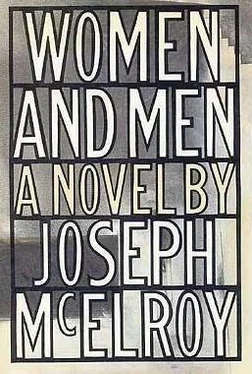Valued in his absence (yes he knew, he knew, he told Flick these phone conversations word for word as if she would change them), and remembered loving his grandmother because in her letters she didn’t nag him — the letters so different from the few "official" ones he’d come across from 1893 when she traveled west with her distant cousin Florence and sent back a regular column for the Democrat: Chicago (the World’s Fair was the excuse, the New Jersey exhibition which was a colonial house staffed with blacks, and a great horticultural exhibit with crystal rocks, and an African village with fifty huts and a witch doctor) but then Florence got ill and dropped away from what proved to be Margaret’s westward course, Colorado, Arizona, no kidding; New Mexico, pretty incredible for a Victorian girl — and come to think of it these letters were also rather different from stories she’d told from the time he was too little to remember — about Indians, stories less than The Last of the Mohicans which was the first grown-up book he’d read, though she’d read most of it to him and it made them both (somewhat secretly) cry at the end (and he’d been glad no one else, like his sissy brother, was there) but if less exciting, her own tales of the West and the Indians were more peculiar, more memorable (is that the word? you could build on them) word for word — more human — that was it, more human — so that even though they were made up out of who knew what weird hearsay and daydreams (twice removed) and were not true, you really felt she put herself into them; as indeed she did in her letters to Jim much later at the end of her life when she said she guessed she had it coming after all these years, a Victorian feminist who was hard on her own daughters and corresponded with Jack London, a fact which Mayn never perhaps had told his daughter, who was a socialist and had to find out her own way, which was just accident — her illness — and he heard the clear, familiar laugh in the words he read — not hoots of laughter like when he was a kid, but a — she once wrote him that his father had said to her daughter, Jim’s mother, when she, Margaret, was present with Brad, "We all get what’s coming to us — even you" (who never got "whipped" in her life) — and the grandmother’s letters which were strong and informative would never nag him about coming home to Windrow to visit, the way his father even knowing that his other son Brad was tied right into his girlfriend’s mother’s haberdashery store would make Brad feel guilty about the mere prospect of taking a temporary job in a department store in Trenton. (Andrew. Andrew. With the unconvincingly bone-crunching handshake all by himself studying zoology. Andrew. Andrew. Had lost his father, hadn’t he?) But Jim had had an experience of being valued in his absence — was that it, dear Joy? Crazy idea. Did he make Joy that way? Kind of nuts, but strong enough to leave him— to find words to leave him.
Valued in his absence. He was a bit drawn into that, but so were two or three other guys whose names he’d heard her mention. But he could think of two couples who weren’t having children and lived so close that — well, didn’t he envy them? — well, if they weren’t reading In Cold Blood together or Dickens, or doing their laundry together (well, he must have read one book by Dickens in high school but he couldn’t say honestly for sure if he’d read a second and never cared to open those diaries of the 1820s—30s—40s. Mayne who must have grandfathered the man who never knew an ancient healer’s weather secret until it was too late to keep it from spreading eastward), or holding hands at the supermarket checkout or (breathing tandem) swimming side by side (or — who knew? — single-file in one economical lane) in the pool on the top floor of their building or, month in, month out, playing tennis inside a giant sagging but taut half-dirigible laced down above a parking lot, cooking together, or (peeing possibly in unison) shitting together so to speak, which Jim Mayn had no hesitation about as Flick and Andrew might know and neither did Joy (most of the time apparently) though the issue didn’t seem to come up with her. Could you say she kept modesty a secret?
He thought he was better about secrets than she; he had no use for them, yet that meant he would also leave them where they were. The first time he and she had talked in the restaurant in 1956—and her friend’s Russian was getting ready to sing — Jim had told her what he said was the only real secret in his family, told it like an afterthought or like a "lady’s pistol" in the pocket of an attache named Karl at an arms-control conference in Scandinavia; but as soon as he said it was, he said he realized there were some others. But, O.K., the only one in his family not to know that Brad his younger brother was a love-child had been Brad himself (like he’d been adopted and never told)—"But why didn’t you tell Brad?" — and yet, of the two of them, Brad was the devoted son — at least to his supposed (and Jim’s real) father — while Jim actually had preferred Bob Yard—"preferred" that raunchy, explosive old bastard (though not "old" then), the byblow adulterer in question who had maintained a running (at least) conversation with Mayn Senior over the years while Mayn Senior, known as Mel, was supposed not to know about his wife and Bob, but did, while the New York grandchildren didn’t know till years later and the Windrow grandchildren never — as if they were adopted (which they were). Supposed, that is, by one who liked Mel Mayn (or warmed to him) least, the gifted grandmother who wrote action-packed, plain, not especially feminine letters and told wild stories to Jim and who couldn’t love Brad and his older brother Jim the same and at some point stopped trying to keep up with the unhappiness of their mother, her daughter, Mel’s musically gifted wife, Bob Yard’s one-time relatively secret lover.
But when this family secret got told and somewhat enlarged upon one night years and years later after Joy had been Joy Mayn for a dozen years, she said astoundingly, as if the world were not after all going to end, "So that’s the way it fell out. Must have been heavy, but I don’t pick it up."
"You’re saying ‘So what,’ I guess, and that’s what/ felt in the beginning, I thought, but I guess I felt like blowing my brains out."
Their voices blurred into their persons.
Funny, I was thinking of suggesting it, Joy said.
I need practice, he said.
She had never questioned whether she totally liked him, and knew he had picked this up now.
I could practice with blanks, he said.
That’s no good, she said, and they could have burst out laughing, the capability was there.
No, he said.
Go and see a psychiatrist, she said. They had a laugh on that note. That is, if that was what he wanted to do, but not because his mother committed suicide.
Mayn knew what she meant. And that she’d been shaken, and not because Flick and Andrew would know, like kids learning that one of their parents had been married before.
Now was too late to be helpless; she had known for ages that he had never been able to understand being married. Or, which might be worse, he knew this was her feeling, right or wrong, about him; and now, that family secret got tiresome to believe — which devastated them both as if the story could be a substitute for further secrets and was unreal and temporary.
But knowing what she meant, he couldn’t speak. The weight was not in him of those experiences — it was near, but not in — like a near limb that’s gone to sleep, yet not uncomfortable (but come on, was he kidding?).
And the subject returned as if by itself to her complaint about the TV. The same complaint she made now on the long-distance phone.
Читать дальше












